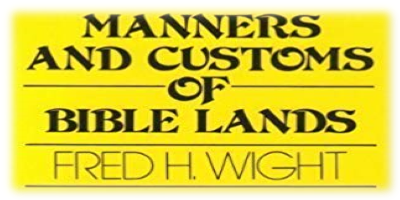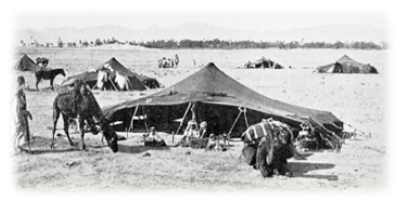Topics  Manners & Customs Manners & Customs 
 Excerpts from Manners and Customs of Bible Lands
Excerpts from Manners and Customs of Bible Lands
By Fred H. Wight
Introduction
It is easy for Occidentals to overlook the fact that the Scriptures had their origin in the East, and that each one of the writers was actually an Oriental. Since this is so, in a very real sense the Bible may be said to be an Oriental Book. But many are quite apt to read into the Scriptures Western manners and customs, instead of interpreting them from the Eastern point of view.
Many passages of Scripture that are hard for the Westerner to understand, are readily explained by a knowledge of the customs and manners of Bible lands. On the other hand, to ignore this subject is to deprive one's self of a thorough mastery of the Bible, both Old and New Testaments.
For many years the Arabs were the custodians of Palestine. In the seventh century, an army of Arabs broke away from Arabia and invaded the Near East. They brought with them the habits of life inherited from countless generations before them. Since they have lived in these lands ever since, they have largely become the conservators of the manners and customs of Bible times.
There are three classes of Arabs in these lands. First, there is the Nomad or Bedouin Arab, who is a shepherd and lives in tents. Second, there is the Peasant or Fellahin Arab, who is a farmer and usually lives in a village one-room house. Third, there is the City or Belladin Arab, who as a rule engages in business in the larger cities. The Belladin Arab has come in contact with western civilization more than the other classes, and therefore his manner of life has undergone a certain amount of change. On the other hand, the Peasant Arab has changed his customs very little, and the Nomad Arab practically none at all. Through the centuries the Arabs have for the most part considered it to be morally wrong to change their ancient customs. For this reason the manners and customs of Bible-land Arabs are very much the same as the Jews of Bible times. There are some exceptions to this rule, and most of those have to do with religious observances.
 |
|
|
Related Pages by Jeff A. Benner
 | | Tent dwellings (Article)
In the Bible, living in tents is of ancient origin. It goes back before the days of Abraham. |
 | | Foods and their preparation for eating (Article)
The ordinary food of the average Hebrew of Bible times was bread, olives, oil, buttermilk cheese, fruits and vegetables and meat on rare occasions. |
|






